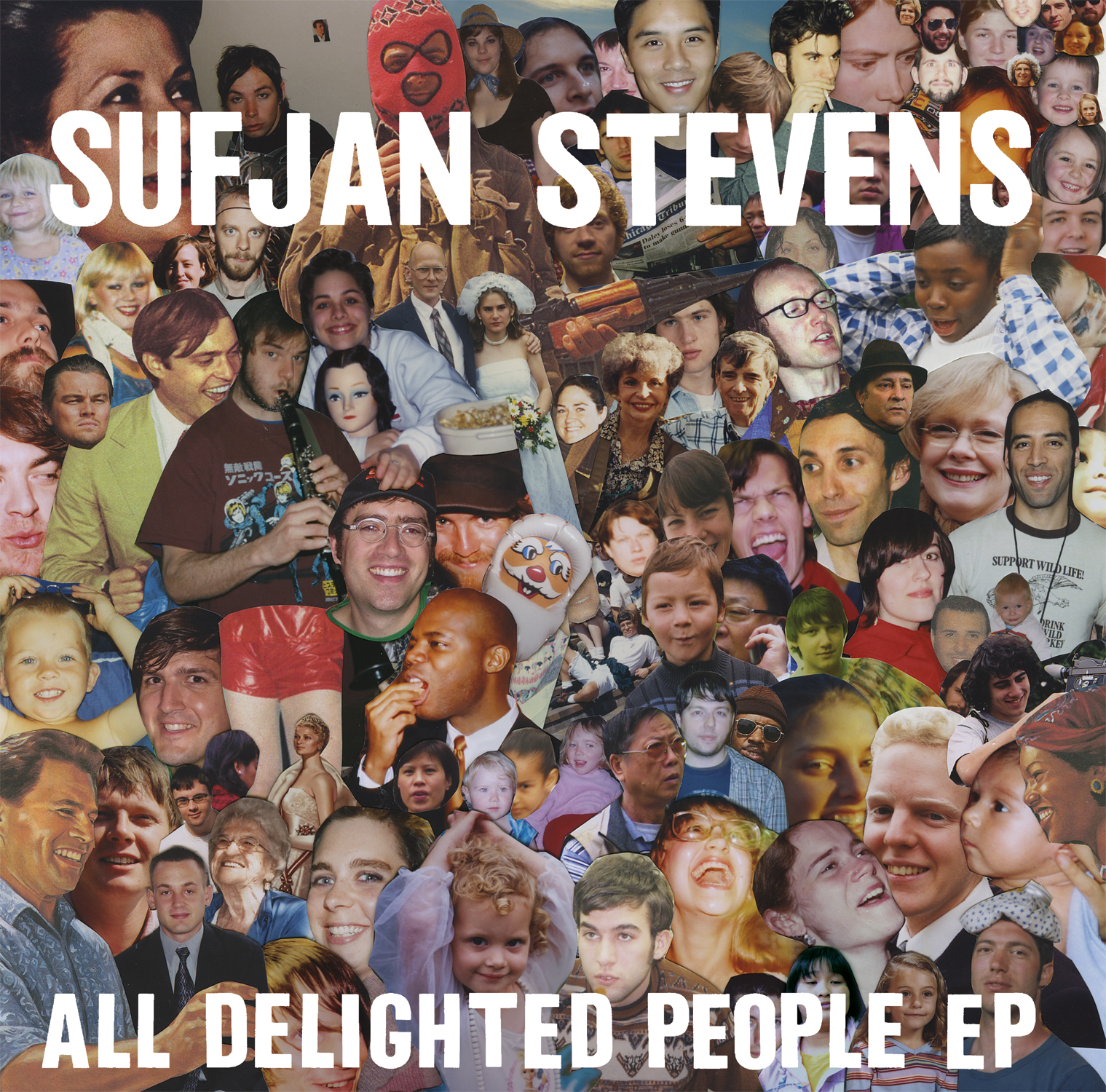
Over five years ago, Sufjan Stevens’ Illinois finally arrived in stores, with Superman stripped off the cover. But since then, he’s played Clark Kent, mild-mannered, hiding in plain sight. A brief rundown of how he’s stayed on our radar by doing everything except releasing a proper follow-up to Illinois: there was a collection of B-sides and alternate takes from Illinois that was damn near as long (The Avalanche), a boxed set containing five EPs of holiday music (Songs For Christmas), a multimedia celebration of a Brooklyn thoroughfare (The BQE), a 10-minute recording for Dark Was the Night, appearances on the last two National records among other one-offs and guest spots.
So while it wasn’t surprising for him to drop the All Delighted People EP out of nowhere, the more people initially learned about it, the more it gained a worrisome quality. Stevens had gone on record bemoaning the strictures of the traditional album cycle, and a guy as unconventially prolific as he could certainly be expected to make his latest work available on Bandcamp the very day the public heard of its existence. But, the “EP” qualifier: It’s over an hour long. About 95% of bands will never make an album longer than 50 minutes. It was easy to jump to the conclusion that all of this low-impact, hedge-betting was meant to lower the expectations for the “long-awaited follow-up to Illinois” by presenting it as an idea dump. A lot of people felt understandably let down: Why was the guy who won us over with his staggering ambition seemingly now afraid of failure?
Of course, we all know now that what Stevens considers his new album, The Age of Adz, awaits us in October, which oddly supports the notion that this EP is a clearinghouse of older ideas. Weighty and stuffed full of them, the record doesn’t reveal all of its charms immediately, yet unlike his previous work it doesn’t ask for total immersion. All Delighted People allows you to choose your own adventure: the sheer length of Illinois or Michigan could tempt you to shear off some of the instrumentals for a more streamlined listen, but that would sort of be missing the point. In contrast, if you think the “classic rock version” of “All Delighted People” is totally redundant (and you probably will), on this grab bag of a record it does nothing to upset its surroundings.
That approach does favors to the original version of “All Delighted People” and “Djohariah”, self-contained song islands that would have been nearly impossible to include on Sufjan’s cohesive albums. “All Delighted People” is a definitive Sufjan song, encompassing all his guises over the span of 11 deceptively brisk minutes: joyous overseer of big-top orchestration and intimate balladeer, preacher and confessor. “All Delighted People” feels capable of peaking at any given moment, which makes it a consistently gripping listen up to its pulled-taut outro of tremolo strings. Oddly, the much shorter re-edit is the one that feels like a chore to get through, largely because the second half enables Stevens’ weakness for prickly and aimless short-circuited guitar soloing.
Though it employs the same choir cooing and brass fanfare typical of his past work, the supine “Djohariah” still comes off as a work borne of artistic freedom for Stevens, its simmering build, improvisatory soloing, and enormous runtime suggesting that he got a copy of Hot Buttered Soul and liked what he heard. Does it really need every single second to get its point across? Maybe not, but though “Djohariah” is allowed to expand to an impossibly billowy 17 minutes, it’s still classic Sufjan at its core, an endearing love letter to his sister (named in the title), as she suffers through the indignity of an abusive relationship.
Between those massive bookends are the sort of humble short stories that represent what listeners have been missing in the midst of his prodigious post-Illinois experimentation. “Heirloom” and “Arnika” in particular have a comforting, early Sunday feel to them, not just in topicality, but in how you can practically hear the morning dew on the acoustics and delicate vocals. Throughout, Stevens is concerned about how you can connect with another individual without imposing yourself on them. “Arnika” is the most straightforward expression of this confusion, Stevens sighing, “I’m tired of life/ I’m tired of waiting for someone/ I’m tired of prices/ I’m tired of waiting for something,” quiet and devastating desperation seeping out like from a deflating balloon. But framing them as a “return to form” sells them short; as affecting as his prior work in this range may have been, there was a certain compositional similarity to them, just four chords and a mellifluous melody. Here, you get Stevens taking more chances with structure and cadence, whether the stripped-down bluesy phrasing of “Enchanting Ghost” or the synth-spiked “From the Mouth of Gabriel” taking “Seven Swans” one step further by portraying God and possibly himself as a possessive, vengeful lover instead of just a devoted caretaker.
It isn’t the mere existence of Age of Adz that puts this EP in perspective, though– the electronic sonics of first taste “I Walked” are a blatant sign that we may ultimately have to retire the idea of Sufjan Stevens as a banjo-toting cartographer of the heart and the continental United States going forward. The scrapbook-like cover of All Delighted People makes sense then, as its contents serve as a humble and friendly keepsake, songs that deserve to be heard, but belonging to a chapter in Stevens’ artistic livelihood that he needed to close to maintain his vitality.
— Ian Cohen, September 7, 2010
